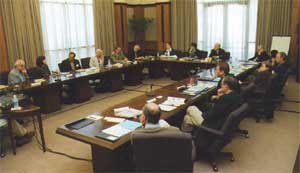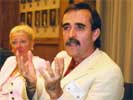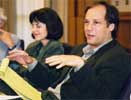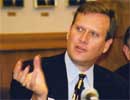Cracking the Code: Creating New Lifelines between Journalists and Academics
Key Research Questions

Key Recommendations:
- Build better bridges between newsrooms and the academy.
- Collect an annual inventory of important newsroom questions.
- Focus on research that can be applied.
- Make the research readable. Edit it for clarity and organize it for accessibility. Feed it back to the newsroom for comment and reaction.
- Alert interested editors to important initiatives via executive summaries. Link to full reports.
- Spotlight each year’s best research in a publication.
- Award each year’s best research with a prize.
- Archive the best research by topic, perhaps in an online library.
- Make journalism schools portals to university expertise.
- Create business incubators between journalism schools and foundations to fund small projects that would help influence and stimulate new digital structures and forms.
- Build a matchmaker service to partner journalists interested in a subject with academics interested in the same area.
- Build a sustainable clearinghouse that would oversee these functions.
- Examine new J-school models that would interact better with the industry and value different tenure requirements.
Key Research Questions
The participants were asked to come up with at least one key question they would like to have answered by academic research.
One thing was clear. They had a lot of questions. There is a lot of hunger for basic, useful information. The responses ranged from pleas for practical ideas, such as new economic models for newspapers and ways to provide suburban zoned coverage that really work, to questions about what readers and viewers find useful.
There were more cosmic questions, too, such as: What is news anymore? And how do journalists’ definitions of news differ from the public’s? What is the economic value of trust? And can we mobilize intellectual capital to influence the new digital media?
The journalists and academicians were not far apart. Here are some highlights.
Pam Luecke, Former Editor, Lexington Herald-Leader, Lexington, KY
What are New Economic Models for Newspapers?
“I would love to see some research on a new economic model for newspapers … I think the economic model that has worked well for decades is in jeopardy and it’s leading to some bad decisions at a lot of newspapers.
“I would love to read some alternative ideas for how you can support a labor-intensive, news-gathering effort without being so dependent on advertising and/or circulation revenue.
“You could certainly explore a model where there is no investment in a printing press. You could explore a model where circulation pays the way entirely …
“Those of us in the industry have a hard time thinking of a model other than the one we have. And because the margins have historically been so large, it’s hard to contemplate a model where the margins would not be that large.”
Nancy Conner, Former Reader Advocate, St. Paul Pioneer Press, St. Paul, MN
How do we Define the Notion of Usefulness?
“One area I would like to see researched is the notion of usefulness. We’ve been told the public is seeking utility in the paper. They want something they can use. They need to see the paper as indispensable to daily life and they want to see solutions. Our readers want to see ways to solve problems that we’ve raised and that have depressed them. They want to see what program might be a model for a solution. Where can you get involved? Are there areas where one could actually help become part of the solution?
“We are casting around to figure out what truly constitutes usefulness in a reader’s life. What information do readers, at least a large group of them, take away from the paper that is truly indispensable and couldn’t be easily obtained anywhere else? And that adds to the civic life in our area …
“Consultants came in and did a study, then returned to tell us we need to be more useful. They said that our readership was very interested in education but they were not satisfied with our coverage … How do you get your arms around this dissatisfaction? How do you understand the need we are not filling? … There’s something about content that bothers readers.”
Chris Peck, Editor, The Spokesman-Review, Spokane, WA
What is News?
“The question can boil down to a headline: Is news dead? … When you look at the vast array of information that is available online or in the world, the actual news component is very small. There’s a lot of information; there’s a lot of special-interest-driven commentary; there’s a lot of research. 
“But the component that is defined as news, which has been the thing that newspapers and, to a lesser extent radio and television news, have tried to build upon, is a shrinking part of the information spectrum and a very small part of the online world. The reason that’s important is that the strength of newsrooms right now is their belief that they know the answer to what news is. They have a certain sense of [being] the ‘keeper of the flame.’ We know we’re going to be reporting on the news no matter what.
“Well, that’s also the greatest weakness of newsrooms because [journalists] believe they know what the world is and they’re carrying that forward. This tension has set up a quandary for many newsrooms to try to say exactly what news is and is it relevant?
“We need a research tool that can help editors measure … the strength of the connection between what they think news is and what people who are reading the paper or watching TV think news is … Journalists think tinkering will produce the answer. They think the answer is to put another person on the case or keep doing more reporting on, for example, education.
“My question is really a bigger one … It’s not one more education reporter … You need to talk about where the points of connection are between where lives are lived and the newspaper. I fear that the actual points of connection are not nearly as great as people inside the newsrooms think.
“The question I would start with is: Where is the point where you move from me living my little life to the larger community life? At what point do these things really touch?
“Journalists need to know that. The culture of journalism is so strong. They think they know. I think that I know. But I’m not sure we do.”
Kathy Spurlock, Executive Editor, The News-Star, Monroe, LA
How do we Make Leadership Choices?
How do we Find People to Hire?
“I don’t think you can consistently face splintering audiences, declining readership and all of the different things happening in our communities and say, ‘Gee, we just need to beef up our education coverage.’ I think it’s a bigger picture than that. We have to be able to get to the bottom of it, sort it out as it happens. And it’s happening very, very rapidly.
“I struggle with the available analytical information to try to make wise leadership decisions. I have to determine the things we really need to be focusing on in our newsroom and in our community. Where do we need to be strengthening what we do on a daily basis? Where do we need to be getting out of the newsroom or changing our newsroom culture?
“[In Monroe,] there is significant media consolidation. Our public radio station quit offering local news. Our NBC affiliate merged with our Fox affiliate and we’re the only daily newspaper. We are the information source for the region.
“The consolidation of media has left us with very few voices and people with fewer information sources. So what should responsible community journalism be?
“The other thing I’d like to see researched – and this would be a joint project of the newspaper industry and journalism schools – is how we’re going to get people to come into this business, to attend journalism schools and to become professionals … We have a horrible time finding people to hire. That’s changed within the last six to eight years. The projections of the potential pool, based on who’s out there and who’s in school now, are scary. So scary that people are starting their own journalism schools at their newspapers.”
J.J. Yore, Executive Producer, Marketplace, Los Angeles
How do we Fix the Talent Drain?
“How do we fix the journalism talent drain or the dearth of journalism talent in public radio? … If it has to do with compensation, I’d like to look and see whether that’s true. I’m not sure that’s the reason we have so many positions that go unfilled … With the consolidation of the media, I think public radio has a special place in the journalism community and I don’t really think the academic journalism programs are feeding that system.”
Dorothy Wilson, Managing Editor, The Sun Herald, Gulfport, MS
What is the Impact of Zoning on Communities?
How do Newspapers make Information Useful to People?
“I would like to see a sociological component of research, looking at whether the zoning of news results in a Balkanization of a community. Are newspapers perpetuating segregation in class and racial structures through the zoning process? Is zoning binding a community or further separating it?
“My question has to do with how readers use the newspaper … Can any research be done to provide newsrooms with a ‘five basics’ of what really works in the newspaper to get people informed and get them to the polls? We put a lot of information out there but it’s not necessarily in a form that is useful to people. And I don’t know if we’re giving them the information they really want.”
Jan Schaffer, Executive Director, Pew Center for Civic Journalism
What are More Useful Models of Storytelling?
“I read the paper in a very different way now that I am no longer in a newsroom. I think we need to revisit our narrative forms of writing stories in a wholesale way. The inverted pyramid that was invented during the Civil War is no longer useful.
“What if we were to experiment with deconstructing stories into their component parts and using these parts on different platforms for different audiences – streakers, strollers and scholars?
“You could have the incremental news developments, but the boiler plate and the historical timeline can happen somewhere else. You can have the story we want to tell our readers. And the story readers want to tell us.”
Phil Meyer, Knight Chair in Journalism, University of North Carolina-Chapel Hill
What is the Economic Value of Trust?
“What is the economic value of trust? Newspapers are in the ‘influence’ business not the ‘eyeball’ business. The eyeball business relates to the idea that we have to be supported by advertising … If you’re in the influence business, you have a product that inspires trust and makes you more valuable to readers and advertisers … If we could show that trust has more economic value, and if we could quantify it so that accountants understand it, we might actually do some good.
“In the Information Age, there is so much competition for public attention the media is in danger of losing its historical standards of trust and decency in order to do bizarre things to grab attention. If you see that the motivation is to grab attention, that accounts for a lot of the strange things that happen across all media platforms these days.
“I think we also need to research the connection between credibility and sense of community … My students and I drew a connection between the two and where the newspaper was clearly involved with a sense of community, there was a strong predictor of credibility. This needs to be followed up.”
Everette Dennis, Director of the Center for Communication, Graduate School of Business, Fordham University
Can we Avoid Technological Determinism?
“What are the big questions? One that intrigues me is whether, in the digital age, we face technological determinism. Do we sort of lay down and play dead and watch technology happen to us?
“We have a great history of this in journalism. When the telegraph arrived, everything changed about journalism – writing styles, the way people thought, the way they organized everything. They didn’t plan it. They just started doing it for practical reasons.
“The copy desk was invented in the 1880s and the whole of journalistic practice changed: The role of the writer vs. the editor, the power relationships of journalism. Long forgotten but very important.
“Now we’re in the digital age and we’re almost certain that there are going to be new structures and forms. We’re not going to have traditional journalistic writing on the Web forever. We’re going to have symbols and new languages. That’s either going to happen and we’re going to sit and watch it happen, or we’re going to play a role in shaping it.
“My question is: How can we mobilize intellectual capital to stimulate, influence and monitor the new digital media? How can you stay on top of this so we can be part of it … and not just let it happen or cede control to the techies?
“One way to do this is to create business incubators between journalism schools and foundations to fund small projects – whether it’s creating new audiences or looking at demographic audiences in different ways. We don’t experiment enough in journalism … We don’t have a way to engage in true R&D …
“I see the value of journalism school as being kind of a matchmaker, sort of a portal to the university. If they know universities well, they might pull up bits and pieces from psychology, sociology and begin to answer some of these questions.”
Arlene Morgan, Director of Professional Development, Columbia University Graduate School of Journalism, Former Readership Editor, The Philadelphia Inquirer
How do we Retain Minorities?
“We need more elaboration on the subject of diversity … The question is: What happens to minorities when they come into newsrooms? Why don’t they stay? What kinds of issues do they deal with? And why can’t newsrooms fix those issues?”
David Kurpius, Assistant Professor, Manship School of Mass Communication, LSU
What are Civic News Models for TV?
 “What is a civic model for news stories on local television news? What does it look like? What is its role? … Is there a model for telling a story in a way that a citizen can actually take something away from a local television news story rather than simply being entertained? And that begs the question: What is news?
“What is a civic model for news stories on local television news? What does it look like? What is its role? … Is there a model for telling a story in a way that a citizen can actually take something away from a local television news story rather than simply being entertained? And that begs the question: What is news?
“I’ve been out of the news business and I now find that the stories that interest me are not the same ones that interested me as a news director. The local media have no interest in the vandalism in neighborhoods around Baton Rouge … But local neighborhood groups have picked up on it and have developed neighborhood watch groups and held meetings. It’s a big story but it hasn’t been picked up on the radar. Why is that not considered news? I would say it wouldn’t have been considered news when I was a news director. And yet citizens see the issue as big news.
“We assume all communities think about news the same way … But I would argue that Minneapolis and New Orleans think about and want different types of news … Has anybody asked what the African-American community or the Hmong community want in news?”
Gene Foreman, Foster Professor, Penn State University, Former Managing Editor, The Philadelphia Inquirer
Is there a Magic Bullet for Zoning?
“I’m looking for anybody who has the magic bullet for zoning, how to cover the suburbs … How to cover the news, what to cover, even down to how to play it.
“The Inquirer is trying to do a paper within a paper. I’d just like to know if somebody out there is doing a good job. What’s working? Perhaps no one has a single solution but perhaps a lot of different places have some things that are working. Maybe with some research, we can put them all together.
“We don’t have the zones in the city of Philadelphia because there’s not the advertising revenue to replicate what we do in the suburbs. So that is another problem that we have, in our effort to be more diverse and cover the whole community.”
Esther Thorson, Associate Dean for Graduate Studies, Missouri School of Journalism
How do we Reward Good Research?
“My question is probably affected by the fact that I’m an administrator. I’m in charge of a graduate faculty and a doctoral faculty at Missouri. It’s a very applied faculty compared with many doctoral programs in the United States.
“In the academic world, publication in Journalism and Mass Communication Quarterly is it. Beyond that, translating it into any form anybody can understand is not relevant to almost anybody’s career in the academy.
“So if you’re going to get high-quality research, you are going to have to go back to square one and say: How can we find a compensation program or a reward program that encourages academics to give a darn about what professionals think about their research or whether they apply their research?
“I think there are models. I don’t think they’re in existence currently, but I think they exist in people’s minds. If we could work towards solving that problem, we would find that thinking that all of Journalism and Mass Communication Quarterly articles are irrelevant is a gigantic mistake.
“It’s a mistake predicated on the fact that they are written in code. And if you don’t know the code, you’re not going to understand the article.
“So what would motivate anybody that knows the code to work with somebody who could translate it into high-impact journalism?”
The group went on to discuss how academics could be encouraged to do more applied research.